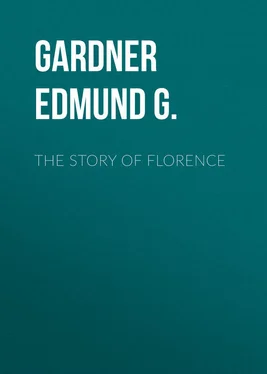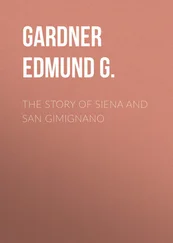Edmund Gardner - The Story of Florence
Здесь есть возможность читать онлайн «Edmund Gardner - The Story of Florence» — ознакомительный отрывок электронной книги совершенно бесплатно, а после прочтения отрывка купить полную версию. В некоторых случаях можно слушать аудио, скачать через торрент в формате fb2 и присутствует краткое содержание. Жанр: История, foreign_antique, foreign_prose, на английском языке. Описание произведения, (предисловие) а так же отзывы посетителей доступны на портале библиотеки ЛибКат.
- Название:The Story of Florence
- Автор:
- Жанр:
- Год:неизвестен
- ISBN:нет данных
- Рейтинг книги:3 / 5. Голосов: 1
-
Избранное:Добавить в избранное
- Отзывы:
-
Ваша оценка:
- 60
- 1
- 2
- 3
- 4
- 5
The Story of Florence: краткое содержание, описание и аннотация
Предлагаем к чтению аннотацию, описание, краткое содержание или предисловие (зависит от того, что написал сам автор книги «The Story of Florence»). Если вы не нашли необходимую информацию о книге — напишите в комментариях, мы постараемся отыскать её.
The Story of Florence — читать онлайн ознакомительный отрывок
Ниже представлен текст книги, разбитый по страницам. Система сохранения места последней прочитанной страницы, позволяет с удобством читать онлайн бесплатно книгу «The Story of Florence», без необходимости каждый раз заново искать на чём Вы остановились. Поставьте закладку, и сможете в любой момент перейти на страницу, на которой закончили чтение.
Интервал:
Закладка:
The eleven years that follow Campaldino, culminating in the Jubilee of Pope Boniface VIII. and the opening of the fourteenth century, are the years of Dante's political life. They witnessed the great political reforms which confirmed the democratic character of the government, and the marvellous artistic embellishment of the city under Arnolfo di Cambio and his contemporaries. During these years the Palazzo Vecchio, the Duomo, and the grandest churches of Florence were founded; and the Third Walls, whose gates and some scanty remnants are with us to-day, were begun. Favoured by the Popes and the Angevin sovereigns of Naples, now that the old Ghibelline nobility, save in a few valleys and mountain fortresses, was almost extinct, the new nobles, the grandi or Guelf magnates, proud of their exploits at Campaldino, and chafing against the burgher rule, began to adopt an overbearing line of conduct towards the people, and to be more factious than ever among themselves. Strong measures were adopted against them, such as the complete enfranchisement of the peasants of the contrada in 1289–measures which culminated in the famous Ordinances of Justice, passed in 1293, by which the magnates were completely excluded from the administration, severe laws made to restrain their rough usage of the people, and a special magistrate, the Gonfaloniere or "Standard-bearer of Justice," added to the Priors, to hold office like them for two months in rotation from each sesto of the city, and to rigidly enforce the laws against the magnates. This Gonfaloniere became practically the head of the Signoria, and was destined to become the supreme head of the State in the latter days of the Florentine Republic; to him was publicly assigned the great Gonfalon of the People, with its red cross on a white field; and he had a large force of armed popolani under his command to execute these ordinances, against which there was no appeal allowed. 8 8 Some years later a new officer, the Executor of Justice, was instituted to carry out these ordinances instead of leaving them to the Gonfaloniere. This Executor of Justice was associated with the Captain, but was usually a foreign Guelf burgher; later he developed into the Bargello, head of police and governor of the gaol. It will, of course, be seen that while Podestà, Captain, Executore (the Rettori ), were aliens, the Gonfaloniere and Priors (the Signori ) were necessarily Florentines and popolani.
These Ordinances also fixed the number of the Guilds at twenty-one–seven Arti Maggiori, mainly engaged in wholesale commerce, exportation and importation, fourteen Arti Minori, which carried on the retail traffic and internal trade of the city–and renewed their statutes.
The hero of this Magna Charta of Florence is a certain Giano della Bella, a noble who had fought at Campaldino and had now joined the people; a man of untractable temper, who knew not how to make concessions; somewhat anti-clerical and obnoxious to the Pope, but consumed by an intense and savage thirst for justice, upon which the craftier politicians of both sides played. "Let the State perish, rather than such things be tolerated," was his constant political formula: Perisca innanzi la città, che tante opere rie si sostengano. But the magnates, from whom he was endeavouring to snatch their last political refuge, the Parte Guelfa, muttered, "Let us smite the shepherd, and the sheep shall be scattered"; and at length, after an ineffectual conspiracy against his life, Giano was driven out of the city, on March 5th, 1295, by a temporary alliance of the burghers and magnates against him. The popolo minuto and artizans, upon whom he had mainly relied and whose interests he had sustained, deserted him; and the government remained henceforth in the hands of the wealthy burghers, the popolo grosso . Already a cleavage was becoming visible between these Arti Maggiori, who ruled the State, and the Arti Minori whose gains lay in local merchandise and traffic, partly dependent upon the magnates. And a butcher, nicknamed Pecora, or, as we may call him, Lambkin, appears prominently as a would-be politician; he cuts a quaintly fierce figure in Dino Compagni's chronicle. In this same year, 1295, Dante Alighieri entered public life, and, on July 6th, he spoke in the General Council of the Commune in support of certain modifications in the Ordinances of Justice, whereby nobles, by leaving their order and matriculating in one or other of the Arts, even without exercising it, could be free from their disabilities, and could share in the government of the State, and hold office in the Signoria. He himself, in this same year, matriculated in the Arte dei Medici e Speziali, the great guild which included the painters and the book-sellers.
The growing dissensions in the Guelf Republic came to a head in 1300, the famous year of jubilee in which the Pope was said to have declared that the Florentines were the "fifth element." The rival factions of Bianchi and Neri, White Guelfs and Black Guelfs, which were now to divide the whole city, arose partly from the deadly hostility of two families each with a large following, the Cerchi and the Donati, headed respectively by Vieri dei Cerchi and Corso Donati, the two heroes of Campaldino; partly from an analogous feud in Pistoia, which was governed from Florence; partly from the political discord between that party in the State that clung to the (modified) Ordinances of Justice and supported the Signoria, and another party that hated the Ordinances and loved the tyrannical Parte Guelfa. They were further complicated by the intrigues of the "black" magnates with Pope Boniface VIII., who apparently hoped by their means to repress the burgher government and unite the city in obedience to himself. With this end in view, he had been endeavouring to obtain from Albert of Austria the renunciation, in favour of the Holy See, of all rights claimed by the Emperors over Tuscany. Dante himself, Guido Cavalcanti, and most of the best men in Florence either directly adhered to, or at least favoured, the Cerchi and the Whites; the populace, on the other hand, was taken with the dash and display of the more aristocratic Blacks, and would gladly have seen Messer Corso–"il Barone," as they called him–lord of the city. Rioting, in which Guido Cavalcanti played a wild and fantastic part, was of daily occurrence, especially in the Sesto di San Piero. The adherents of the Signoria had their head-quarters in the Cerchi Palace, in the Via della Condotta; the Blacks found their legal fortress in that of the Captains of the Parte Guelfa in the Via delle Terme. At last, on May 1st, the two factions "came to blood" in the Piazza di Santa Trinità on the occasion of a dance of girls to usher in the May. On June 15th Dante was elected one of the six Priors, to hold office till August 15th, and he at once took a strong line in resisting all interference from Rome, and in maintaining order within the city. In consequence of an assault upon the officers of the Guilds on St. John's Eve, the Signoria, probably on Dante's initiative, put under bounds a certain number of factious magnates, chosen impartially from both parties, including Corso Donati and Guido Cavalcanti. From his place of banishment at Sarzana, Guido, sick to death, wrote the most pathetic of all his lyrics:–
"Because I think not ever to return,
Ballad, to Tuscany,–
Go therefore thou for me
Straight to my lady's face,
Who, of her noble grace,
Shall show thee courtesy.
"Surely thou knowest, Ballad, how that Death
Assails me, till my life is almost sped:
Thou knowest how my heart still travaileth
Through the sore pangs which in my soul are bred:–
My body being now so nearly dead,
It cannot suffer more.
Then, going, I implore
That this my soul thou take
(Nay, do so for my sake),
When my heart sets it free." 9 9 Rossetti's translation of the ripresa and second stanza of the Ballata Perch'i' no spero di tornar giammai .
Интервал:
Закладка:
Похожие книги на «The Story of Florence»
Представляем Вашему вниманию похожие книги на «The Story of Florence» списком для выбора. Мы отобрали схожую по названию и смыслу литературу в надежде предоставить читателям больше вариантов отыскать новые, интересные, ещё непрочитанные произведения.
Обсуждение, отзывы о книге «The Story of Florence» и просто собственные мнения читателей. Оставьте ваши комментарии, напишите, что Вы думаете о произведении, его смысле или главных героях. Укажите что конкретно понравилось, а что нет, и почему Вы так считаете.












